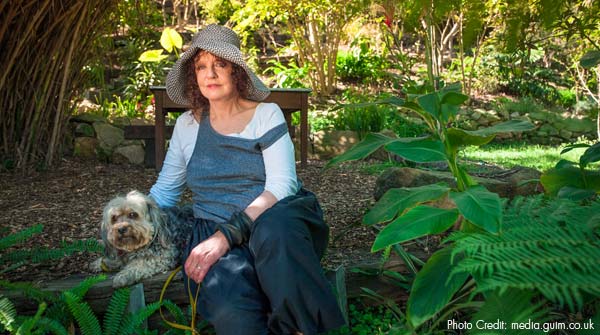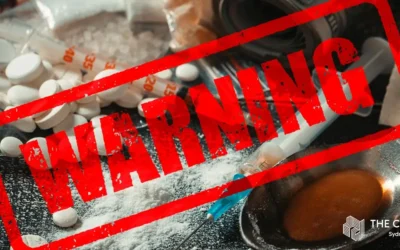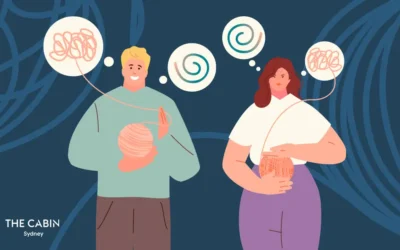Wendy Whitely threw herself into creating a beautiful ‘secret garden’ after getting clean from heroin. Here we look at how horticultural therapy (gardening) can really help in addiction recovery.

Frequently referred to as the ‘goddess muse’ of the late avant-garde artist Brett Whitely, Wendy Whitely has been making headlines lately involving a completely different topic. Once, spiralling out of control with a heroin addiction alongside Brett, Wendy has been sober since 1988 and has been pouring her heart and soul into creating a beautiful ‘secret garden’ in Lavendar Bay, Sydney.
After getting clean from heroin in 1988, Wendy began to focus the majority of her days in addiction recovery on transforming the government junkyard next door to her home into something incredibly beautiful. Without any permission from the city, she was constantly concerned that one day people would come with chainsaws and bull-dozers and destroy everything she had worked so hard to create. But that did not stop her from continuing. “I needed, badly, to make something… another chemical process,” she recalled. “Brett’s famous painting Alchemy is about that, [transforming] something from something ugly into something beautiful.”
And turn this junk-yard into something beautiful is exactly what she did, because at the beginning of October this year, the New South Wales state government honoured the garden with a 30-year lease and the possibility of another 30-year renewal when the time comes. And to Ms. Whitely this is, of course, incredibly good news. The garden will remain and be kept up for years to come. “I did not ask,” she said, “and it seems it’s worked out.”
Using Horticultural Therapy to Increase Chances of Successful Addiction Recovery
Horticultural therapy (also known as gardening therapy) is becoming a popular recommendation for those in addiction recovery. Gardening therapy can be beneficial in many ways, and no — it does not have to be on such a large scale as what Ms. Whitely has accomplished. Even small scale gardening projects can benefit addiction recovery in the following ways:
1. It gets you outside.
First and foremost, gardening gets you outside, breathing fresh air and soaking up some Vitamin D. When your skin comes in contact with the sun, it naturally produces Vitamin D which has many benefits including fighting off diseases such as cancer and increasing your ability to absorb calcium which in turn creates strong, healthy bones. But besides that, the fresh air and sunlight just feel good. When you are in a slump in addiction recovery, it is all too easy to spend your days in front of the television eating snacks. But knowing that your garden is outside awaiting your attention is often the motivation you need to get outside and do something!
2. It boosts confidence and gives you a sense of accomplishment.
Being responsible for another living thing, even if it is ‘just a plant’ gives you a sense of belonging and makes you feel needed. If you neglect your garden, flowers and plants will droop, lose their colour and eventually die. Seeing your plants looking so sad and lonely will yet again encourage you to be active and get involved in an activity instead of getting lost in negative thought processes. Plus, when the garden flourishes and beautiful flowers are produced, or you get to make a salad with the vegetables you have grown, you will get a small confidence boost from this sense of accomplishment.
3. It teaches patience and persistence.
Tending a garden, whether it is a flower garden or vegetable garden, involves a lot more than a lot of people realise. Springtime means taking out the weeds, turning over soil, and planting seeds and bulbs. The plants must then be watered and tended all summer before removing them at the end of the season — leaving a fresh clean space to begin with again the following year. This ongoing care teaches you the patience and persistence that you need to deal with your own recovery. Once you plant the seeds, you cannot just leave them be and hope for them to grow. Just as getting clean does not mean that you do not need to take special care of yourself anymore. Addiction recovery is a long, and sometimes difficult process that requires full-time maintenance — just like a garden.
One transitional therapist explained it in this way: “There are rich metaphors [between horticultural therapy and recovery]. For example, when you weed a garden, you need to get to the root of the weed to really make a serious dent … If you just pluck the problem from the surface it will flourish below and get more and more difficult to manage.”
4. It connects you to the earth.
For many, being in addiction recovery means connecting to a higher power. That does not mean God, (unless you want it to) but rather a sense of belonging within the world that we live in — a sense that all living things are connected — people, plants and animals. And what better way to truly feel this connection than to get outside, feel the earth in your hands, and make other living things grow?
5. It is relaxing.
Any activity that you enjoy and that gets you away from the daily struggles of life that can weigh you down can be considered relaxing. Allowing yourself this time to connect with nature and be on your own — away from people, away from judgement — is a great time to self-reflect and remain committed to your own goals.
Getting Started with Horticultural Therapy in Addiction Recovery
Planning a garden should not be stressful. Begin by going to your nearest garden store and speak to the sales associates about the amount of space you have, shaded areas, etc. and get their advice on what you should begin with. If you are really new to gardening, take it easy at first. Buy a few flowers that need minimal attention, and build on them once you feel comfortable. If you do not have much (or any) ground space outside, use pots. There are many flowers and vegetables that will thrive in pots if you know which ones to choose.
The bottom line is this: submerging yourself into a gratifying activity such as Wendy Whitely did, can give your life new purpose and boost not only your confidence and happiness, but your chances at a successful addiction recovery as well.


